Redefining their Korean American identity through a new deli
Katianna and John Hong have cooked in Michelin-starred restaurants, but their newest endeavor has taken them on a very different path. On Jan. 10, they are scheduled to open Yangban Society, a casual deli super and mini-mart that they say will challenge notions of what it means to be Korean American.
Yangban was designed to be many things at once — a place to gather items for a picnic, grab drinks before dinner or sit down for a meal. It occupies the two-story, 5,000-square-foot space that previously housed the upscale French restaurant Bon Temps, which closed in April 2020. The Arts District property has gone through a transformation that plays with design elements, like the Douglas fir-slatted banquettes that line the walls on the second floor and are paired with marble tables.
Downstairs, a row of glass cases will be filled with hot and cold items that nod to deli culture and Korean banchan — including hot smoked trout and cream cheese, and pickled vegetables. The deli will also feature rotating specials made in the kitchen — ranging from kimchi and pork belly pozole to a jajangmyeon-meets-bolognese fusion served over rice. There will be Asian-style rotisserie chicken slow-cooked over charcoal and wood, and soft serve from Petaluma-based Double 8 Dairy, one of only two water buffalo dairies in California. Customers will be able to buy canned cocktails and bottles of Hite beer or Krug Champagne to pair with their meals and grab a table downstairs or upstairs.
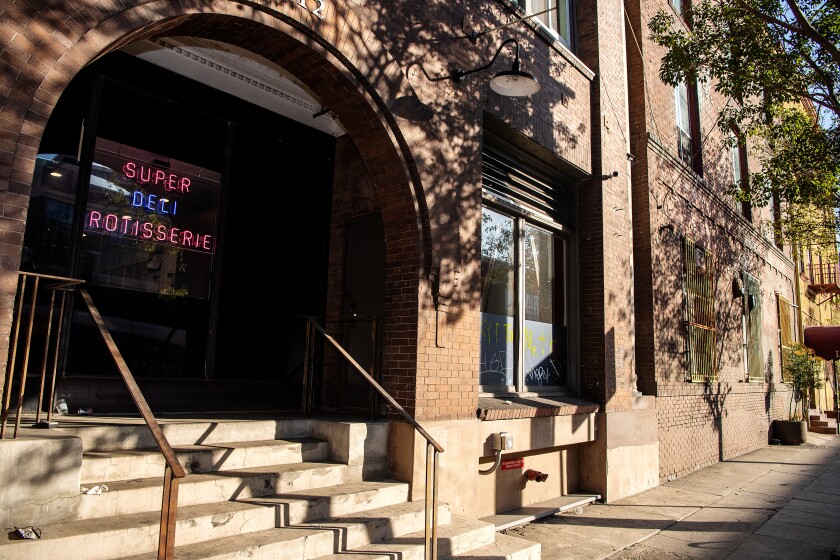
Yangban Society occupies the two-story, 5,000-square-foot space that previously housed Bon Temps in the Arts District.
(Mariah Tauger/Los Angeles Times)
A corner of the second floor — marked by vibrant blue walls — will house a separate super mini-mart, which pays homage to the convenience stores of Japan and South Korea, such as Lawson’s and FamilyMart. The shelves will be stocked with Los Angeles-based and Asian American-owned brands, featuring Katianna’s hand-picked snacks, drinks and sundries, incense from L.A. tattoo artist Hyungi Park, Korean hand-knit sponges, barley tea highballs canned in-house, and a makgeolli rice wine that Sawtelle Sake makes exclusively for Yangban.
The second-floor walls are adorned with photographic prints — of candid street shots taken in the 1980s and 1990s — by Seoul photographer Wook Kim, and the alley outside features a wheat-paste mural by Korean American artist Dave Young Kim.
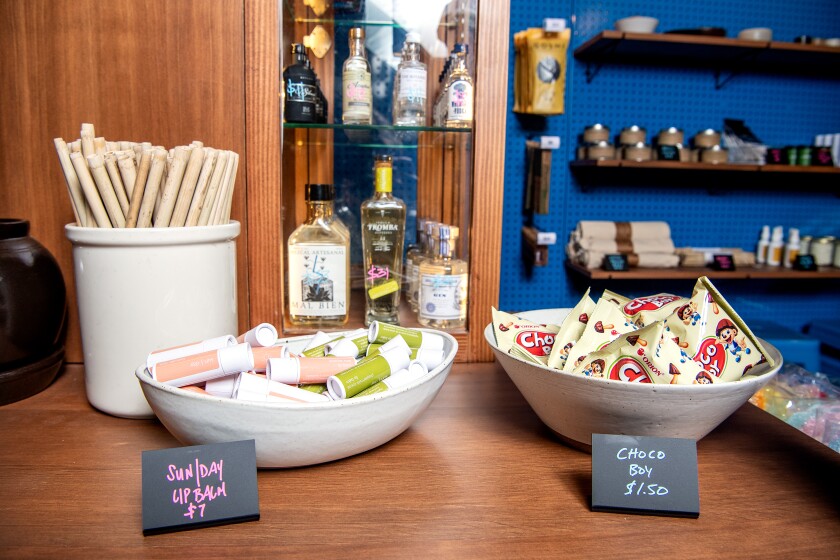
There’s a separate super mini-mart, which pays homage to the convenience stores of Japan and South Korea.
(Mariah Tauger/Los Angeles Times)
For John, the restaurant is about embracing being the son of Korean American immigrants and showcasing all those things: “It’s about being proud, and in educating myself even deeper [about the Korean culture], and finding some closure within that.”
An evolved taste
Katianna, who was born in South Korea, was only three months old when she came to the United States and was adopted by her German-Jewish father and Irish-Catholic mother. Her father worked as an attorney; her mother was an art teacher.
Growing up in a predominantly white suburb in upstate New York, Katianna, 38, said she identified so strongly with being white that she often wondered about her ancestry. (A DNA test, she said, indicated she was 97% Korean.)
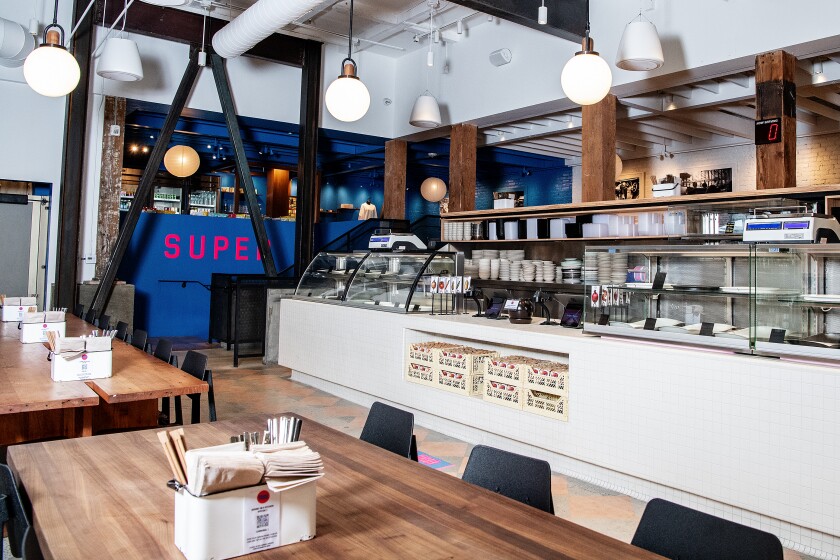
The deli will feature rotating specials made in the kitchen.
(Mariah Tauger/Los Angeles Times)
Family rituals included attending a Unitarian church on Sundays; afterward, they’d stop at a deli, where Katianna steeped herself in the culture and would grab large turkey sandwiches for lunch. Her paternal grandmother (“a great cook,” Katianna said) introduced her to homemade matzo ball soup.
(While Katianna’s cooking is also influenced by her Irish-Catholic heritage, she doesn’t talk about it as much — and it’s become a bit of a sore spot between her and her mother. “She’s actually gotten really upset recently because I keep talking about the Jewish part. And she’s Irish. And I’m like, ‘I don’t know, I really like the matzo ball.’”)
Katianna said her mother sent her to Korean camps in the summer to learn about her culture, but she remembers it being a bad experience: “I didn’t have any Asian friends. I didn’t want to associate with them because that made me stand out and be different, and I was just trying to blend in.”
When she was 16, an aunt and uncle took her on her first trip back to South Korea, but it was a frustrating experience. “I already wasn’t feeling totally connected here [in the United States],” Katianna said. “And then, after going to Korea and realizing that Koreans don’t claim you either because you don’t speak Korean and you look very American, I felt like I didn’t belong anywhere.”
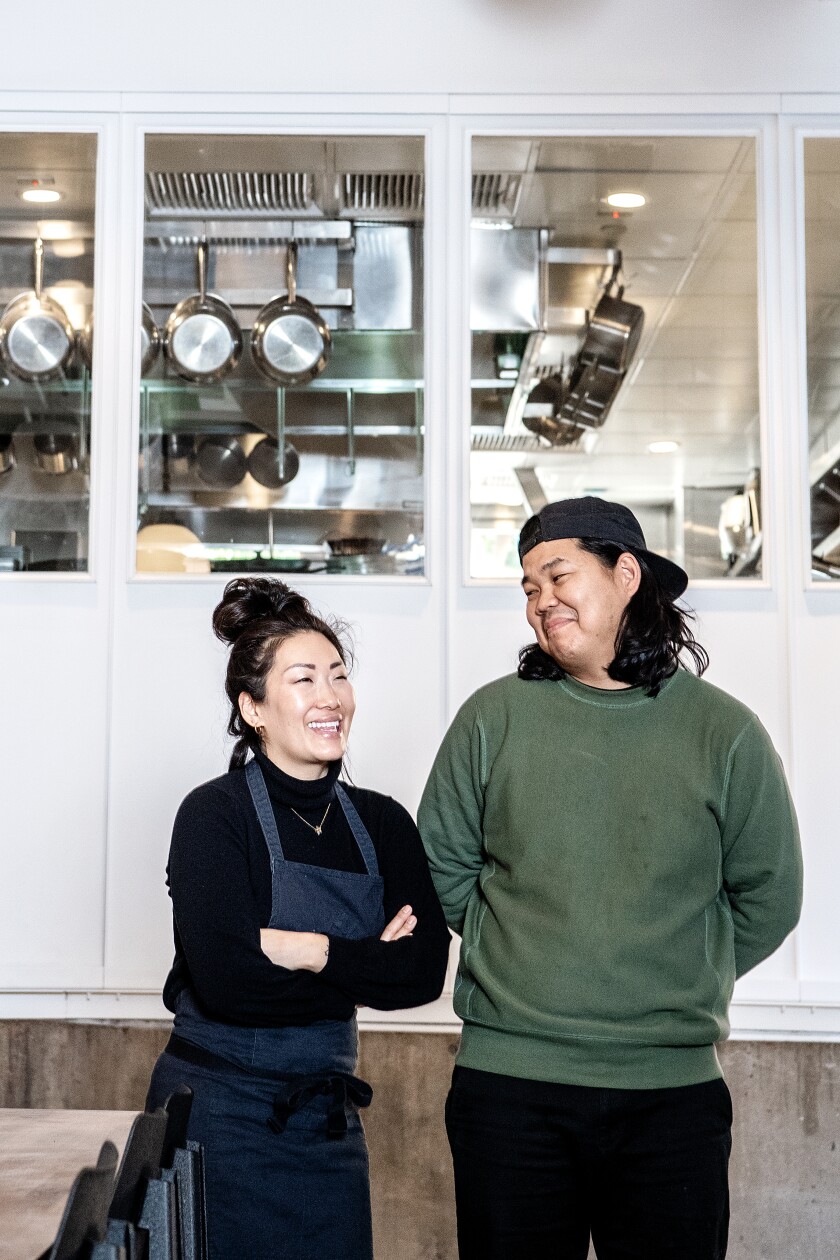
It wasn’t until the Hongs took a trip to South Korea together that they noticed a shift in their thinking about Korean cuisine.
(Mariah Tauger/Los Angeles Times)
It wasn’t until she was in her 20s — when she was cooking at Mélisse in Santa Monica and met John in the kitchen — that she became interested in Korean culture again, and he became her gateway.
John also grew up in a white neighborhood — in Highland Park, Ill. — where it was commonplace for him to visit delis and partake in friends’ bar mitzvah celebrations. His parents had immigrated from South Korea to the United States in the 1980s. They didn’t speak much English and ran a dry-cleaning business.
“It was hard because there wasn’t much help on the assimilation part,” said John, 34. “They were very Korean and let me deal with not really fitting in.”
He was always surrounded by members of his extended family, who spent time in the kitchen cooking Korean food, and these experiences led him to the culinary industry. After doing a two-year externship at the lauded Alinea in Chicago, he followed his family to L.A. and landed at Mélisse.
Katianna and John were still only colleagues when she moved on to work at Christopher Kostow’s The Restaurant at Meadowood in Napa, where she eventually became the first female chef de cuisine at a Michelin three-star establishment in the United States. She convinced John to join her, and they eventually began dating and moved up the ranks together. Katianna went on to open Charter Oak, Kostow’s second restaurant in Napa, and John became Meadowood’s chef de cuisine.
It wasn’t until they took a trip to South Korea together that they noticed a shift in their thinking about Korean cuisine. The experience also inspired them to reconsider the way they thought about fine dining. John says he initially wanted to work at the “best” (mostly Eurocentric) restaurants, but his objectives were starting to change. “There’s the same value in your own ethnic food, but it just hasn’t been necessarily showcased,” he said.
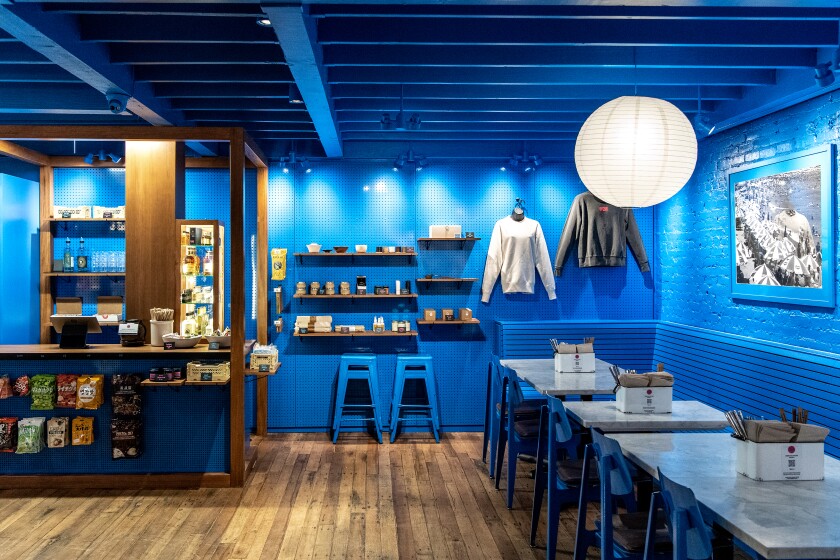
The deli has gone through a transformation that plays with design elements.
(Mariah Tauger/Los Angeles Times)
Six years ago, they began fantasizing about creating Korean dishes that channeled their own experiences. After getting married and having a child, they moved back to L.A. in 2019 with a seed of an idea for Yangban. It would be a departure from the fine dining world they had long inhabited. Their ideas of success had evolved.
“Success for us would be able to prepare delicious food that we could stand behind and has the integrity to reach everyone and not just this very small group of wealthy people that come to a three-Michelin-starred restaurant,” Katianna said.
They came up with the tongue-in-cheek name “Yangban Society,” a reference to the Korean aristocratic ruling class of the Joseon Dynasty that essentially made the laws, owned land and slaves, and benefited from their wealthy lineage. Their deli’s name was a satirical approach that flipped the concept of social hierarchy on its head. “Really at its core, it’s about setting the standards for your society, being a positive member of your community and anchoring in these core values, versus what family you were born into and how much money you have,” John said.
They funded Yangban by partnering with Sprout L.A. — the restaurant group that oversees spots like Bestia and République — through a random connection, John explained. Shin Irvin, the founder and creative director of Folklor, notable for his work with the Line Hotel and Gjelina, helped design the space.
“I totally got what they were talking about, because I am Korean too and adopted just like Kat,” said Irvin, 50. “The idea of doing an American/Korean/Jewish deli hit the right notes in me. I grew up on the East Coast with all these delicatessens, and I saw Korean influence in New York and here in L.A.”
The Hongs have been working on several specials that speak to their combined experiences and love for market-driven ingredients. They’ll have a pea shoots and chives salad, their take on Korean barbecue restaurants’ scallion salads. John’s version of a French dip is inspired by Korean galbi-tang (short rib soup) and Chicago-style Italian beef sandwiches.
When John thinks back to his formative years, he’s cognizant that he didn’t embrace being Korean because, like most kids, he was trying to fit in. He says he now realizes that being different is cool when you’re older.
Katianna used to think if she opened a respected restaurant serving traditional Korean food, she would finally be accepted by others as being Korean. But that’s changed for her: “In this process, I’ve become more comfortable with, ‘This is my version of Korean. This is who I am, and it’s authentic to us.’”
712 S. Santa Fe Ave., Los Angeles, (213) 866-1987, yangbanla.com
For all the latest Life Style News Click Here
For the latest news and updates, follow us on Google News.
